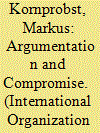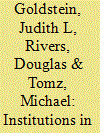|
|
|
Sort Order |
|
|
|
Items / Page
|
|
|
|
|
|
|
| Srl | Item |
| 1 |
ID:
077293


|
|
|
|
|
| Publication |
2007.
|
| Summary/Abstract |
How do states come to select norms? I contend that, given a number of conditions are present, states select norms in three ideal-typical stages: innovative argumentation, persuasive argumentation, and compromise. This norm selection mechanism departs from the existing literature in two important ways. First, my research elaborates on the literature on advocacy networks. I explain why agents engage in an advocacy for a normative idea in the first place; I add the epistemic dimension of reasoning to argumentation theory; and I show in detail the pathways through which persuasive argumentation links an advocated idea and already-established sets of meaning. Second, synthesizing rationalist and constructivist selection mechanisms, I contend that successful argumentation makes recalcitrant actors eager to reach a compromise with the advocates as long as this does not violate their most cherished beliefs. The Republic of Ireland's eventual selection of the territorial status quo norm in the late 1990s lends empirical evidence to this norm selection mechanism
|
|
|
|
|
|
|
|
|
|
|
|
|
|
|
|
| 2 |
ID:
077292


|
|
|
|
|
| Publication |
2007.
|
| Summary/Abstract |
The General Agreement on Tariffs and Trade (GATT) and the World Trade Organization (WTO) have been touted as premier examples of international institutions, but few studies have offered empirical proof. This article comprehensively evaluates the effects of the GATT/WTO and other trade agreements since World War II. Our analysis is organized around two factors: institutional standing and institutional embeddedness. We show that many countries had rights and obligations, or institutional standing, in the GATT/WTO even though they were not formal members of the agreement. We also expand the analysis to include a range of other commercial agreements that were embedded with the GATT/WTO. Using data on dyadic trade since 1946, we demonstrate that the GATT/WTO substantially increased trade for countries with institutional standing, and that other embedded agreements had similarly positive effects. Moreover, our evidence suggests that international trade agreements have complemented, rather than undercut, each other
|
|
|
|
|
|
|
|
|
|
|
|
|
|
|
|
| 3 |
ID:
077296


|
|
|
|
|
| Publication |
2007.
|
| Summary/Abstract |
A central assumption in the globalization literature is that economic openness generates economic insecurity and volatility. Based on this assumption, scholars of international political economy have proposed the compensation hypothesis, which claims that globalization bolsters rather than undermines the welfare state by increasing public demand for social protection against externally generated economic instability. The openness-volatility link is dubious, however, on both theoretical and empirical grounds. In this study, I revisit the volatility assumption, focusing on a crucial difference between openness and external risk in their effect on volatility. My statistical analysis of a panel data set from 175 countries (1950-2002) finds a consistent effect of external risk on volatility of the major economic aggregates, but a largely insignificant effect of openness. These findings suggest that economic volatility may be a mistaken link in explaining the openness-spending nexus, calling for further research on the causal mechanisms linking the two
|
|
|
|
|
|
|
|
|
|
|
|
|
|
|
|
| 4 |
ID:
077291


|
|
|
|
|
| Publication |
2007.
|
| Summary/Abstract |
I present a model of interactions between voters, a government, and a terrorist organization. The model focuses on a previously unexplored conceptualization of counterterrorism as divided into tactic-specific observable and general unobservable tactics. When there is divergence between voters and government preferences, strategic substitution among different modes of attack by terrorists and agency problems between the voters and government create a situation in which the politically optimal counterterrorism strategy pursued by the government in response to electoral and institutional incentives is quite different from the security maximizing counterterrorism strategy. In particular, in response to electoral pressure, the government allocates resources to observable counterterror in excess of the social optimum. This problem is particularly severe when governments put great weight on rent-seeking or care less about counterterror than do voters and when terrorists have a large set of tactics from which to choose. Voters can decrease the magnitude of the agency problem by increasing the benefits of reelection by, for example, slackening requirements for nonsecurity related public goods
|
|
|
|
|
|
|
|
|
|
|
|
|
|
|
|
| 5 |
ID:
077294


|
|
|
|
|
| Publication |
2007.
|
| Summary/Abstract |
This article examines the factors that led to the end of the Cold War from the perspective of the most important U.S. decision makers in both the Reagan and Bush presidencies. The centerpiece of the analysis is a longitudinal study that compares the timing of U.S. decision makers' assessments of the nature of the Soviet threat with changes in Soviet power, foreign policies, and domestic ideology and institutions. This research design allows one to determine if America's key leaders were basing their foreign policies primarily in response to reductions in Soviet power (as realists assert), to more cooperative international policies (as systemic-constructivist and costly signals arguments claim), or to changes in Soviet domestic politics (as democratic peace theories argue). I find that American leaders' beliefs that the Cold War was ending corresponded most closely with Soviet domestic-ideological and institutional changes. As soon as America's most important leaders believed both that Gorbachev was dedicated to core tenets of liberal ideology, and that these values would likely be protected by liberal institutions, they believed the Cold War was ending. These findings help to both illustrate the key determinants of leaders' perceptions of international threats and explain why outstanding Cold War disputes were resolved so smoothly, with the Americans primarily attempting to reassure the Soviets rather than coercing them with America's power superiority
|
|
|
|
|
|
|
|
|
|
|
|
|
|
|
|
|
|
|
|
|